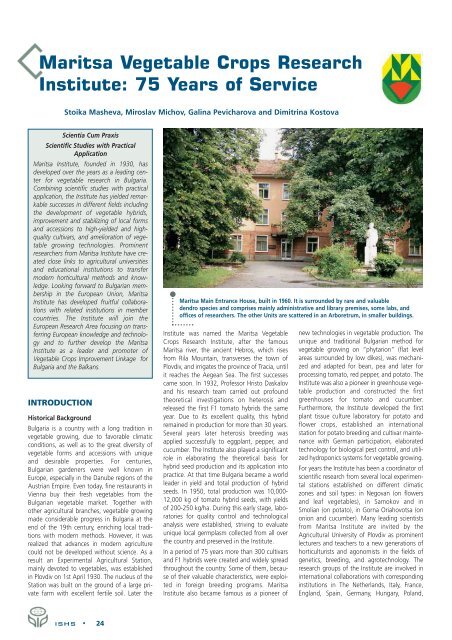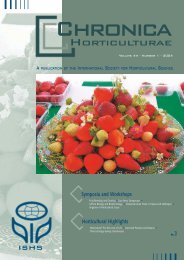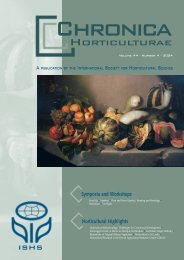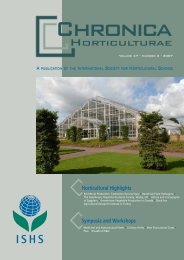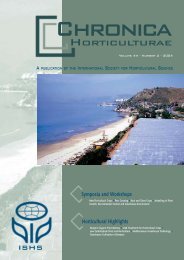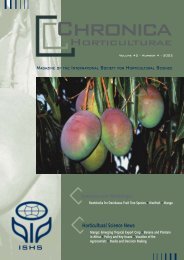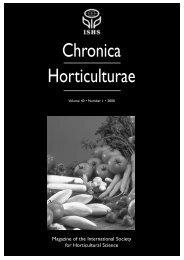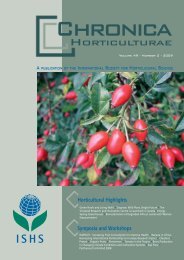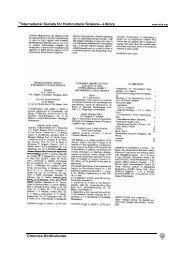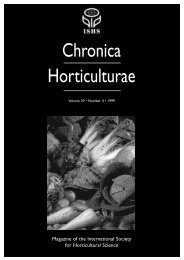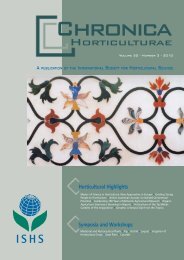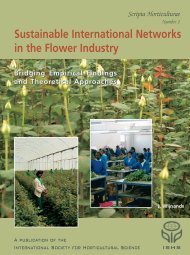Chronica - Acta Horticulturae
Chronica - Acta Horticulturae
Chronica - Acta Horticulturae
Create successful ePaper yourself
Turn your PDF publications into a flip-book with our unique Google optimized e-Paper software.
Maritsa Vegetable Crops Research<br />
Institute: 75 Years of Service<br />
Stoika Masheva, Miroslav Michov, Galina Pevicharova and Dimitrina Kostova<br />
Scientia Cum Praxis<br />
Scientific Studies with Practical<br />
Application<br />
Maritsa Institute, founded in 1930, has<br />
developed over the years as a leading center<br />
for vegetable research in Bulgaria.<br />
Combining scientific studies with practical<br />
application, the Institute has yielded remarkable<br />
successes in different fields including<br />
the development of vegetable hybrids,<br />
improvement and stabilizing of local forms<br />
and accessions to high-yielded and highquality<br />
cultivars, and amelioration of vegetable<br />
growing technologies. Prominent<br />
researchers from Maritsa Institute have created<br />
close links to agricultural universities<br />
and educational institutions to transfer<br />
modern horticultural methods and knowledge.<br />
Looking forward to Bulgarian membership<br />
in the European Union, Maritsa<br />
Institute has developed fruitful collaborations<br />
with related institutions in member<br />
countries. The Institute will join the<br />
European Research Area focusing on transferring<br />
European knowledge and technology<br />
and to further develop the Maritsa<br />
Institute as a leader and promoter of<br />
Vegetable Crops Improvement Linkage for<br />
Bulgaria and the Balkans.<br />
INTRODUCTION<br />
Historical Background<br />
Bulgaria is a country with a long tradition in<br />
vegetable growing, due to favorable climatic<br />
conditions, as well as to the great diversity of<br />
vegetable forms and accessions with unique<br />
and desirable properties. For centuries,<br />
Bulgarian gardeners were well known in<br />
Europe, especially in the Danube regions of the<br />
Austrian Empire. Even today, fine restaurants in<br />
Vienna buy their fresh vegetables from the<br />
Bulgarian vegetable market. Together with<br />
other agricultural branches, vegetable growing<br />
made considerable progress in Bulgaria at the<br />
end of the 19th century, enriching local traditions<br />
with modern methods. However, it was<br />
realized that advances in modern agriculture<br />
could not be developed without science. As a<br />
result an Experimental Agricultural Station,<br />
mainly devoted to vegetables, was established<br />
in Plovdiv on 1st April 1930. The nucleus of the<br />
Station was built on the ground of a large private<br />
farm with excellent fertile soil. Later the<br />
Maritsa Main Entrance House, built in 1960. It is surrounded by rare and valuable<br />
dendro species and comprises mainly administrative and library premises, some labs, and<br />
offices of researchers. The other Units are scattered in an Arboretrum, in smaller buildings.<br />
Institute was named the Maritsa Vegetable<br />
Crops Research Institute, after the famous<br />
Maritsa river, the ancient Hebros, which rises<br />
from Rila Mountain, transverses the town of<br />
Plovdiv, and irrigates the province of Tracia, until<br />
it reaches the Aegean Sea. The first successes<br />
came soon. In 1932, Professor Hristo Daskalov<br />
and his research team carried out profound<br />
theoretical investigations on heterosis and<br />
released the first F1 tomato hybrids the same<br />
year. Due to its excellent quality, this hybrid<br />
remained in production for more than 30 years.<br />
Several years later heterosis breeding was<br />
applied successfully to eggplant, pepper, and<br />
cucumber. The Institute also played a significant<br />
role in elaborating the theoretical basis for<br />
hybrid seed production and its application into<br />
practice. At that time Bulgaria became a world<br />
leader in yield and total production of hybrid<br />
seeds. In 1950, total production was 10,000-<br />
12,000 kg of tomato hybrid seeds, with yields<br />
of 200-250 kg/ha. During this early stage, laboratories<br />
for quality control and technological<br />
analysis were established, striving to evaluate<br />
unique local germplasm collected from all over<br />
the country and preserved in the Institute.<br />
In a period of 75 years more than 300 cultivars<br />
and F1 hybrids were created and widely spread<br />
throughout the country. Some of them, because<br />
of their valuable characteristics, were exploited<br />
in foreign breeding programs. Maritsa<br />
Institute also became famous as a pioneer of<br />
new technologies in vegetable production. The<br />
unique and traditional Bulgarian method for<br />
vegetable growing on “phytarion” (flat level<br />
areas surrounded by low dikes), was mechanized<br />
and adapted for bean, pea and later for<br />
processing tomato, red pepper, and potato. The<br />
Institute was also a pioneer in greenhouse vegetable<br />
production and constructed the first<br />
greenhouses for tomato and cucumber.<br />
Furthermore, the Institute developed the first<br />
plant tissue culture laboratory for potato and<br />
flower crops, established an international<br />
station for potato breeding and cultivar maintenance<br />
with German participation, elaborated<br />
technology for biological pest control, and utilized<br />
hydroponics systems for vegetable growing.<br />
For years the Institute has been a coordinator of<br />
scientific research from several local experimental<br />
stations established on different climatic<br />
zones and soil types: in Negovan (on flowers<br />
and leaf vegetables), in Samokov and in<br />
Smolian (on potato), in Gorna Oriahovotsa (on<br />
onion and cucumber). Many leading scientists<br />
from Maritsa Institute are invited by the<br />
Agricultural University of Plovdiv as prominent<br />
lecturers and teachers to a new generations of<br />
horticulturists and agonomists in the fields of<br />
genetics, breeding, and agrotechnology. The<br />
research groups of the Institute are involved in<br />
international collaborations with corresponding<br />
institutions in The Netherlands, Italy, France,<br />
England, Spain, Germany, Hungary, Poland,<br />
ISHS • 24


